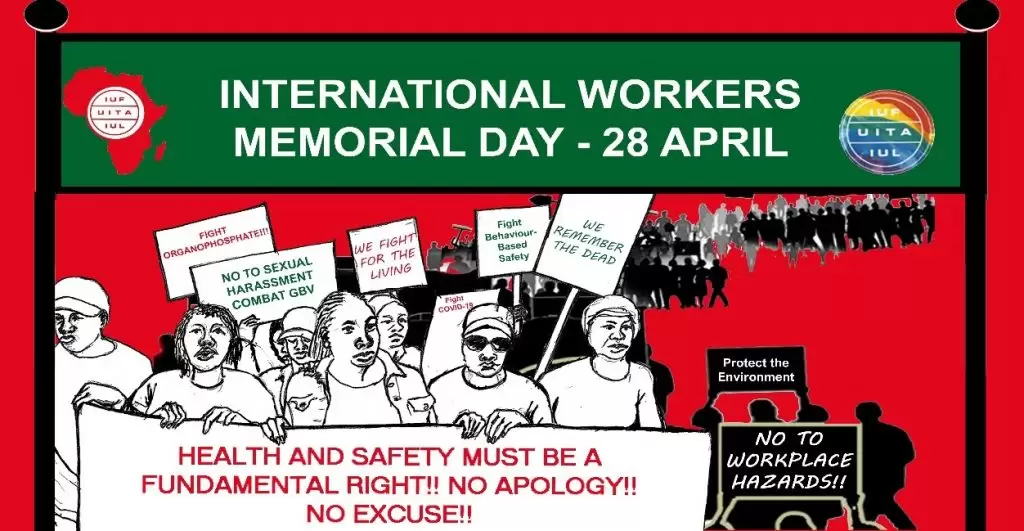For decades, trade unions around the world have come together on April 28, International Workers Memorial Day (IWMD), to remember and mourn workers killed at work or made ill by their work.
The COVID-19 pandemic is shining a harsh light on the working conditions in many of the sectors where the IUF has membership, a harsh light that must inspire us to fight harder for occupational health and safety as a fundamental right, even in a pandemic. Workers in agriculture, food and beverages and food services are classed as “essential” and obliged to continue working to ensure food supplies are maintained. And far too many have paid with their lives.
In the United States alone, over 89,000 workers in agriculture and food processing had contracted COVID-19 by April 15, 2021. Of these 89,000, more than 58,000 were meatpackers and 286 of our sisters and brothers in US meat packing plants have died from the disease.
The Office for National Statistics in the UK cites chefs as being among the highest risk occupational category for deaths from COVID-19. IUF affiliate Unite the Union surveyed chefs to gain a better understanding of the risks involved. They uncovered chefs toiling for months in London’s increasing number of ‘dark’ kitchens. These largely unseen kitchens have been around for a few years but multiplied exponentially during the pandemic to satisfy the demands for take-away food. Unlike a traditional restaurant, these dark kitchens only produce food for delivery with many “brands” in the same location.
Workers reported that physical distancing requirements were ignored; face masks were used intermittently; risk assessments were not done and labour inspectors did not visit.
One of the clearest policy imperatives arising from the experience of the COVID-19 pandemic is that occupational safety and health (OSH) must be given the status of a fundamental right by the International Labour Organization (ILO) alongside the existing fundamental rights: freedom of association, collective bargaining and protection from discrimination, forced labour and child labour. This classification would allocate greater responsibility on governments and employers to protect workers from harm and give trade unions more power to demand that workers finish work safely and return home every day in good health. ILO member States would have to respect and promote the OSH principles and rights whether or not they have ratified the convention.
The IUF will work with affiliates, the ITUC and our sister Global Union Federations to ensure that OSH is classed as a fundamental right at the International Labour Conference in 2022.
We will also be calling for COVID-19 to be classified as an occupational disease to provide enhanced protection for workers and enable access to compensation for families of workers who die or are infected with COVID-19 at work.
Brazil and India have led the way in placing workers in harm’s way through gross state negligence. Public health measures have been undermined and essential workers and their families are suffering terribly. The situation is exacerbated by the refusal of rich countries to waive intellectual property rights at the WTO so the world’s population can be vaccinated more quickly and the life of the pandemic shortened.
While COVID-19 has infected and killed more men than women, it is women who have suffered disproportionately from layoffs, who have had to provide child care while teleworking, and who have been the victims of the horrendous increase in domestic violence that has occurred during the pandemic. The IUF calls for a gender responsive approach to the COVID-19 crisis to ensure that gender inequalities are not reproduced, perpetuated or exacerbated in the context of this pandemic. It is only through the fight against discrimination and with the achievement of gender equality that gender based violence can be eliminated.
Today we mourn the dead and fight for the living. Details of IWMD events can be found here. So please take a minute with your sisters and brothers to remember those who have died and, in their honour, commit to organize, fight and win safe and healthy workplaces.
